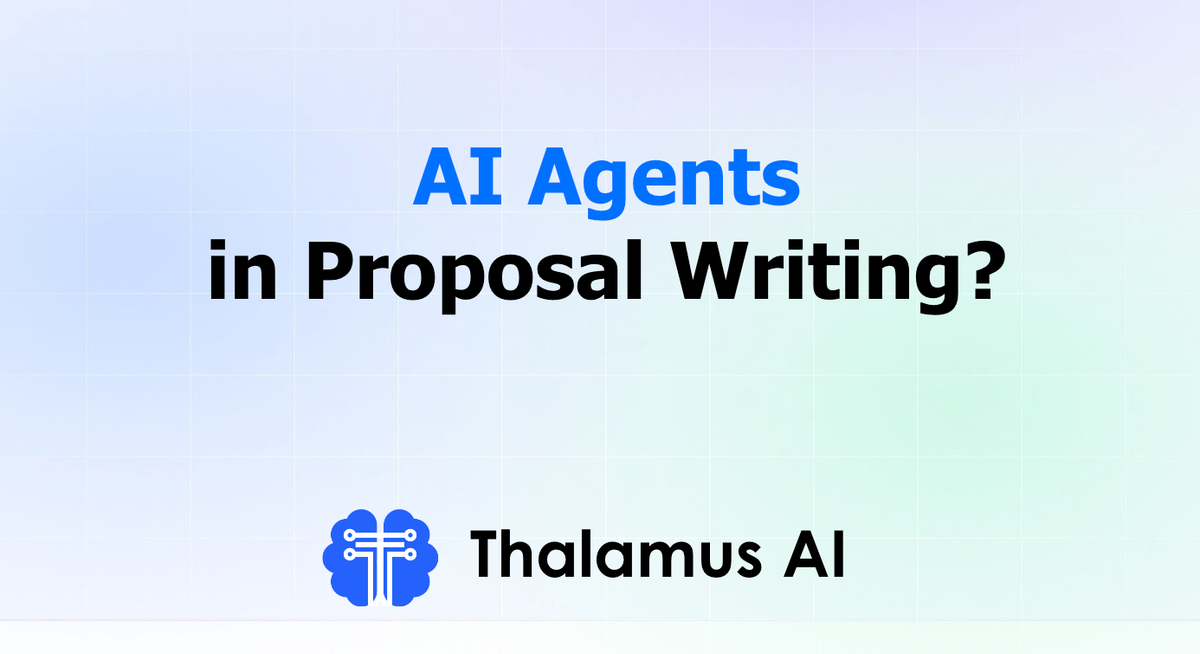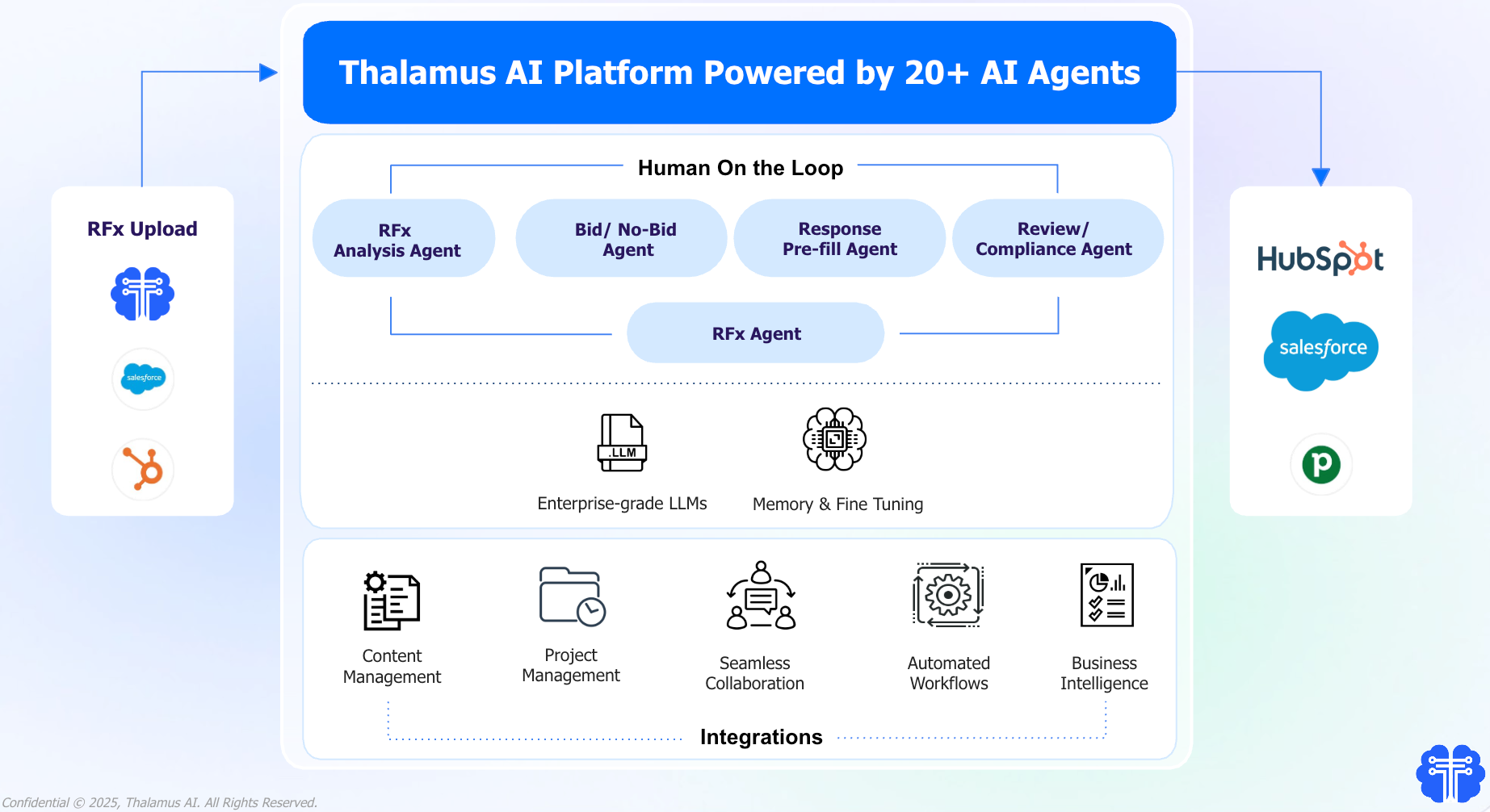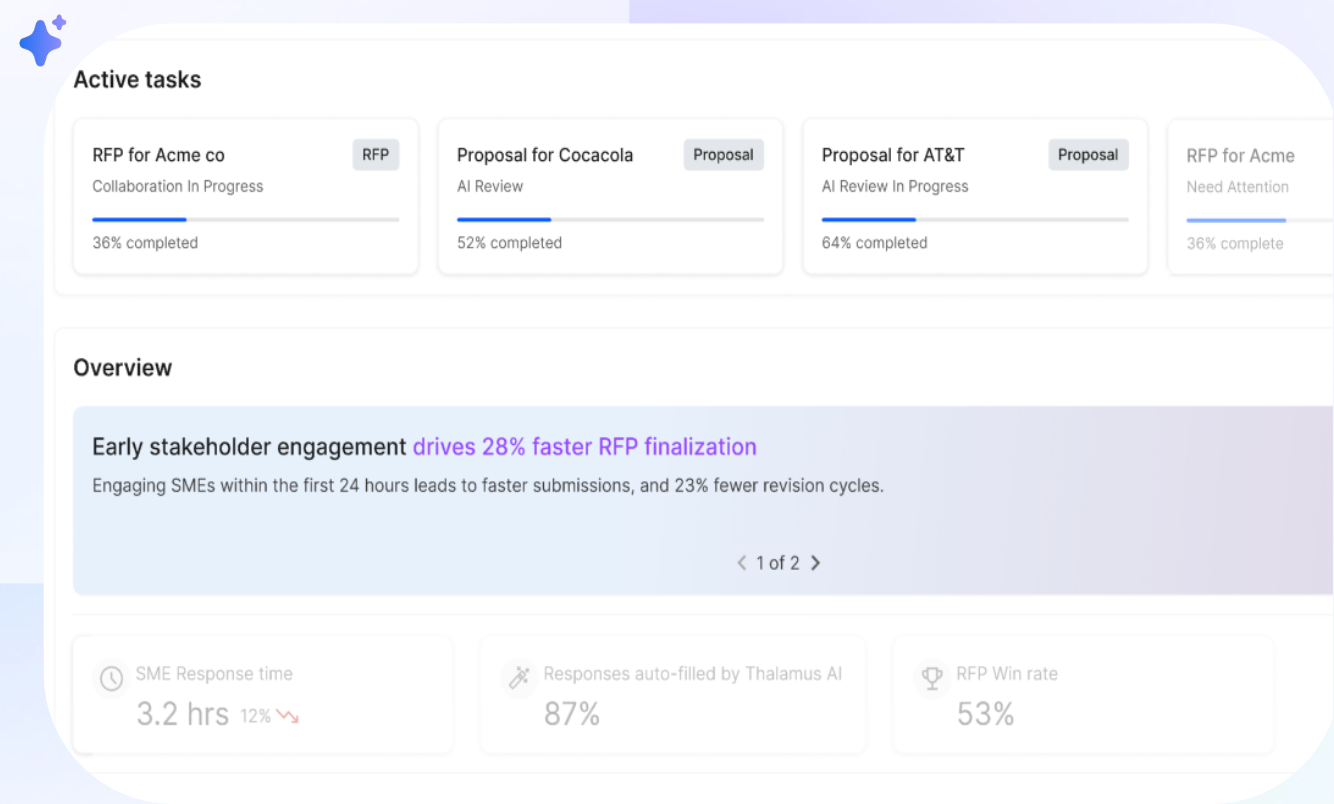AI Agents for RFP Automation: What They Are & Why Enterprises Are Finally Paying Attention

Ready to elevate your RFP game? Schedule a discovery call.
Introduction: Why AI Agents Are Reshaping RFP Automation
For years, proposal teams have relied on traditional RFP response software to manage deadlines, reuse content, and collaborate across departments. But these tools, while helpful, often fall short when it comes to navigating the fast-moving, high-volume demands of complex questionnaires, and Request For Proposals (RFPs).
The Problem Isn’t Just Process. It’s People. The RFx process is broken - and people are paying the price.
- 63% of proposal professionals work overtime regularly (Source: Thalamus AI - Primary Research, 2025)
- 88% report being stressed
- The average happiness score among proposal teams? Just 6.8 out of 10 (Source: Strategic Proposals – The Proposal Happiness Index 2025)
- And while 8.0 out of 10 find the work meaningful, only 6.3 feel truly valued at work
Yet the stakes remain sky-high:
44% of executives say RFx responses directly impact revenue. (Source: Thalamus AI, 2025)
This mismatch between what proposal teams give and what they get - has created a trust and burnout crisis across the industry. Proposal professionals are craving more than tech buzzwords or glorified search engines.
They want support. They want speed. They want strategy. And that’s where agentic AI changes everything. What’s changed? The rise of AI agents - the next generation of intelligent Digital assistants built to transform how RFPs get done.
What is an AI Agent in Proposal Writing?
In simple terms, an AI agent is a smarter, more strategic evolution of Generative AI.
While traditional Generative AI tools (like GPT) can write content, an AI agent goes further. It learns over time. It remembers your voice. It acts.
Think of it as a Generative AI bot with memory and intent - built to understand your company's language, tone, and preferences, and to execute tasks with purpose. AI Agents are built to handle repetitive tasks in Proposal management.
For proposal teams trying to master proposal writing process in 2026, that means:
- AI agents that write like your best junior proposal writer
- Agents that know when to ask for human input and who to ask
- Agents that don’t just generate content, but generate analysis for humans to make decisions like:
- Should we pursue this opportunity?
- Have we answered a similar requirement before?
- Is this response aligned with our Executive Win Themes?
In the RFP world, an AI agent is a Generative AI Assistant with memory and intent - built to handle repetitive tasks, personalize content, and support every stage of the proposal workflow.
A Collective Intelligence: Agents Working in Sync
An Agentic AI Platform for Proposal Management, such as Thalamus AI, introduces a chain of Strategic AI Agents, each hyper-focused on a part of the proposal process - but working together as one team.
For example:
- A Library Agent pulls accurate data from your centralized knowledge base ie. Thalamus AI Library integrated with enterprise document based (like Google Drive, SharePoint, One Drive, product documentation, or past bids)
- That content is passed to the Auto-Fill Agent, which tailors it to the specific ask using natural language processing
- The Review Agent then checks against evaluation criteria and tags missing inputs
- A Project Manager Agent/ RFP Agent routes the draft to the right subject matter expert for review before any answer goes out the door
This creates an AI-powered feedback loop that improves over time - faster responses, smarter content, higher win rates.
By introducing these collaborative agents, Agentic AI Platforms aren't just speeding up proposal writing , but helping teams focus on what really matters: crafting strategic, high-quality proposals that win.
Up next: Let’s unpack how RFP automation has evolved, and where most platforms fall short.
How AI Agents Layer Intelligence Over Traditional AI Proposal Software
While traditional SaaS-based RFP response tools offer helpful dashboards, collaboration features, and proposal builders, AI-first platforms take it a step further by introducing a powerful new layer of intelligence: AI agents. Per the image below, these agents sit on top of standard RFP workflows and turn passive data into actionable intelligence.

Image: How agents sit on top of standard RFP workflows and turn automation workflows into proposal intelligence.
For example, a traditional platform may show you SME response times. But an Agentic AI platform like Thalamus doesn’t stop there - it leverages a Business Intelligence Agent to suggest tactical improvements such as engaging subject matter experts earlier. As shown above, early stakeholder engagement drives 28% faster RFP finalization and reduces revision cycles by 23%.
This shift from metrics to insights is powered by multiple specialized agents: the Content Manager Agent, Project Management Agent, and Response Management Agent, each equipped with memory, fine-tuning, and Generative AI capabilities. These AI agents collaborate behind the scenes to improve response time, boost win rate, and elevate response quality, turning your proposal process from a manual grind into a strategic edge.
Advantages of AI Agents in RFP Automation
In a world where proposal teams are flooded with DDQs, Questionnaires, Request for Proposals (RFPs), and tight deadlines, traditional automation tools fall short. AI agents, especially those built into Agentic AI platforms like Thalamus AI offer a next-level advantage by acting as trained digital teammates across your proposal process.
Here’s how they change the game:
1. Memory + Context = Intelligent Responses
Unlike standalone AI RFP response generators, AI agents have memory and context awareness. They learn how your team writes, remember previous submissions, and ensure every answer reflects your brand voice, whether responding to a security questionnaire, sales RFP, DDQ or technical RFQ.
Example: AutoFill Agent can instantly retrieve answers from your Content Library or Knowledge Sources, refine it to match tone, and pass it to a Response Generation Agent that drafts accurate, on-brand content ready for review.
2. Reduce Repetition, Boost Productivity
AI agents don’t just copy-paste answers, they intelligently automate the time-consuming steps that bog down proposal teams, from tagging requirements to generating pre-approved responses.
Take Content Library management, for example. Most traditional tools rely on Q&A-style libraries that require constant upkeep. But with Thalamus AI’s Content Cleaner Agent and Knowledge Base Agent - outdated entries, conflicting content, and duplicate answers are flagged and resolved via notifications.
Result? Teams report up to 65% reduction in content management, allowing Proposal Managers to focus on strategy instead of clean-up.
(Source: Thalamus AI – RFP Content Library Chaos: How Agentic AI Brings Order to Madness)
And when paired with Google Drive, Word docs, or Excel uploads, agents seamlessly ingest and normalize content - no rigid templates required.
This shift in how content components are managed leads to faster response generation, fewer manual errors, and significantly shorter drafting cycles across the entire RFP workflow.
3. Collaboration Across Specialized Agents
Think of each AI agent as a Strategic Proposal Assistant each with a focused role, working together in a coordinated chain. For example:
- The Content Manager Agent identifies outdated or conflicting content
- The Project Management Agent drives SME follow-ups and deadlines
- The Go/No-Go Facilitator Agent flags risk factors based on your historical win data
Together, they form an intelligent layer on top of your existing stack, enhancing your response management strategy without replacing your tools.
4. Built-In Business Intelligence
AI agents don’t just fill templates - they think. With platforms like Thalamus, agents analyze your RFP response history, win rate, and SME behavior to offer actionable insights.
Example: A BI Agent may suggest looping in SMEs earlier or shortening your response window based on real completion times, boosting efficiency without sacrificing accuracy.

Why AI Agents Matter in RFPs
- Personalization, not just autofill
- Task execution + decision intelligence
- Improved collaboration, speed, and proposal win rate
- Intelligent support across sales teams, bid managers, and subject matter expert
Security Considerations in AI RFP Tools
Well, As proposal workflows evolve from manual processes to AI-assisted automation, Proposal teams needs to be cautious of where to put data. Enterprise RFP teams often manage sensitive information embedded in Questionnaires, Executive Summaries, and confidential bid and proposal writing assets. Trusting an AI RFP response software platform requires more than regular security standards. It demands rigorous, verifiable security protocols.
Why Security Matters More Than Ever
RFP teams in 2026 rely on Word documents, Excel files, and file uploads from a mix of internal and external sources - company wikis, Google Drive folders, and more. These documents contain proprietary data that, if mishandled by a poorly governed AI model, can lead to serious risk.
As AI adoption grows across business development, marketing departments, and proposal teams, IT and InfoSec leaders are rightfully asking - How is our data used? Who has access to it? Is the AI really safe?
Built for Trust: Thalamus AI’s Security Framework
Unlike generic tools that bolt on machine learning features with limited governance, Thalamus AI was designed for secure RFP automation from day one.
Here’s how it ensures enterprise-grade protection across the RFP response generation lifecycle:
- SOC 2 Type 2 Certified
- ISO 27001 Compliant
- Zero Data Retention: Your data is never used to train any public or shared models
- US-Based Infrastructure on SOC 2-compliant clouds
- Role-based agent permissions across content access and editing
- End-to-end encryption across uploads, workflows, and agent interactions
Whether you’re running Security Reviews, reviewing Proposal Drafts, or generating responses via AI-powered technical experts, the platform guarantees privacy by default.
The Future of Proposal Management Is Agentic AI
AI-powered RFP response software is no longer a nice to have - it’s the strategic edge separating high-performing teams from the rest. With the rise of AI Agents, proposal and business development teams can finally scale without burning out, reduce manual process overhead, and generate winning responses with unprecedented speed and accuracy.
Whether you're filling out complex Due Diligence questionnaires, collaborating with subject matter experts, or managing hundreds of Word documents and Excel files, platforms like Thalamus AI give you the AI agents, enterprise-grade governance, and collaborative intelligence needed to thrive.
Ready to meet your AI-powered technical experts? Start your journey with Thalamus AI today.
Want to learn more about how AI Agents are transforming proposal management?
- Read our Top 3 AI Proposal Software in 2026 comparison to see which platform leads in automation, multilingual proposals, and win-rate performance.
- Read the complete buyer’s guide to AI proposal writing software for Federal RFPs. Here
- Want to know what’s next in proposal management? Read the 12 RFP Trends Shaping Proposal Management in 2026.
- Explore which AI prompts actually win proposals? Read our guide: 7 RFP ChatGPT Prompts That Win More Bids (Faster).
- Explore what sets Thalamus AI apart in the new era of RFP automation. Compare Top RFP Software for 2025
- See how Thalamus stacks up against traditional and AI-powered platforms - Here.
- Not sure if your tool is truly AI-First or just SaaS-First? Find Out Here
